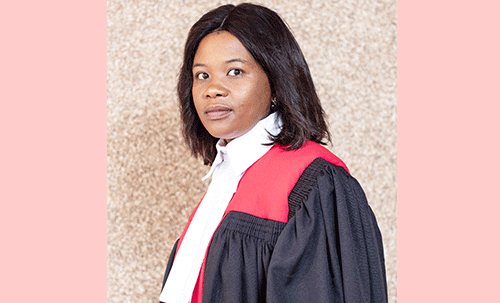Windhoek High Court Judge Philanda Christiaan roasted a magistrate from Swakopmund for “failure to apply judicial care and diligence in the exercise of duties.
In a review judgement on the matter of Reinhold Hinkab, who was convicted of theft and sentenced to a fine of N$8 000 or 12 months imprisonment, Judge Christiaan, in concurrence with Judge Dinnah Usiku, set aside the conviction and sentence, and ordered that the accused be released from custody immediately.
If he paid the fine, the money must be refunded to him. Hinkab had pleaded guilty to the charge, but the magistrate failed to follow the correct procedures. The judges wanted to know how the magistrate was satisfied that all essential elements of the crime were established if the accused did not respond to all questions asked.
According to the magistrate, however, the accused did answer the question in the affirmative, but since she was editing the questions being asked, she forgot to enter the answers before printing the record. Judge Christiaan was not satisfied with the explanation, and said it raised serious concerns.
“A magistrate’s court is without any question a court of record, which mandates that all questions and responses during proceedings are accurately recorded. Any failure to do so can be viewed as a failure in administrative duties,” the judge stressed.
She further said it is critical for proper record-keeping, in order to ensure that reviewing judges are fully appraised of the facts and applicable legal principles, thus enabling an informed determination of whether justice was appropriately administered.
“What further exacerbates the situation in the present case is the magistrate’s admission to editing the record post-factum, thereby omitting the accused’s response to certain questions,” Judge Christiaan fumed, and continued: Such conduct is impermissible.
She stressed that as a judicial officer, the magistrate is prohibited from altering court records in such a way that the accused’s responses are omitted. This, she said, raises serious concerns regarding the credibility of the court’s proceedings, and undermines the reliability of the conviction and sentence.
Magistrates, Judge Christiaan emphasised, are hereby reminded that as judicial officers, they bear the responsibility of safeguarding the integrity of justice, which encompasses the obligation to maintain accurate and comprehensive records of all proceedings.
Moreover, the judge said, the magistrate’s assertion that the public prosecutor’s confirmation of the plea – indicating that all questions were answered comprehensively – is equally unacceptable. The magistrate erroneously assumed that the prosecution’s acceptance of the plea sufficed to establish that the accused had admitted to elements of the offence.
This assumption disregards the magistrate’s duty to independently ensure the accused fully comprehends the charges, acknowledges all elements of the offence, and that a complete and accurate record of all questions and responses is maintained, Judge Christiaan stressed.
She further said in this instance, the failure to record certain responses creates a substantial gap, thereby precluding a conclusion that the accused fully admitted all elements of the offence of theft. In the end, the judge stated, she is not satisfied that the accused admitted to the offence of theft, and the proceedings cannot be in accordance with justice, and the conviction and sentence must be set aside.
-rrouth@nepc.com.na


